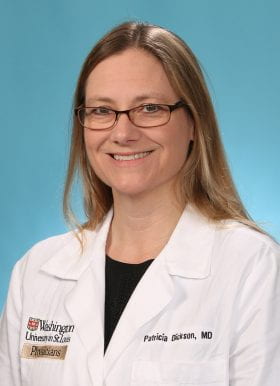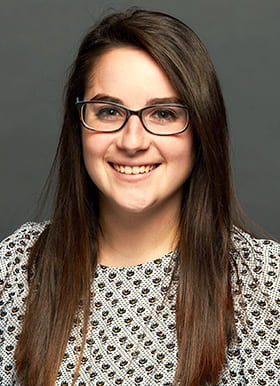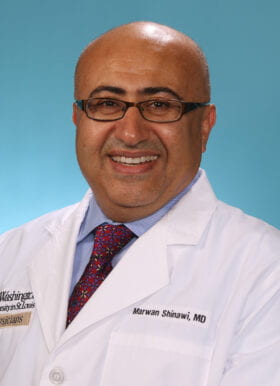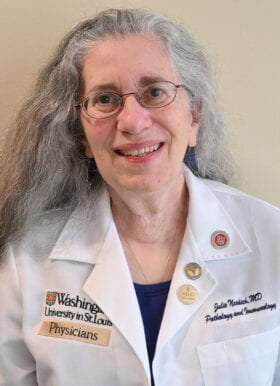Pharmacogenomics Clinic (PGC)
Our Pharmacogenomics Clinic was established at Washington University/St. Louis Children’s Hospital in January 2021. Pharmacogenomics means testing the genes that affect how our bodies react to drugs. Patients are seen by a medical geneticist, genetic counselor and a clinical pharmacist. Pharmacogenomics testing is performed at a CLIA-certified reference laboratory. Data is analyzed using the University of Washington’s Drug Interaction Database (DIDB) platform by Ron Worthington at SIUE and using Clinical Pharmacogenetics Implementation Consortium (CPIC) guidelines. Results are provided to the clinical pharmacist and genetics team, who generate a report for the patient and their referring physician. The report will help doctors choose the right drugs and the right dosing of those drugs for a patient based on that patient’s genetics.
Clinical assessment
Patients and families will complete an intake questionnaire that includes a careful medical history, list of medications taken by the patient, including dosing and frequency, adverse drug reactions (ADR), as well as lack of response to certain medications, atopy, allergies, alcohol intake, smoking, cardiovascular diseases, gastrointestinal and liver problems and renal impairment. In addition, we will obtain a detailed medical history, including previous medications and anesthesia and its related complications, ADRs, hospitalizations and surgeries. We will also collect social history and family history, and a medical geneticist or genetic counselor will complete a pedigree. A review of systems will be performed emphasizing symptoms that could potentially represent an ADR or condition that predisposes to an ADR or lack of response to medications. A physical examination and vital signs will be performed. The diagnostic plan, including using different genetic panels, will be discussed with the patients or their guardians.
Pharmacogenomic testing
Pharmacogenomic testing will be performed at a reference laboratory using panels of medically-actionable drug-gene pairs. The DIDB platform consists of the Metabolism and Transport Drug Interaction Database and the Pharmacogenetics Database (e-PKGene). This collection of manually-curated drug-gene and drug-drug interactions is available via software license from the University of Washington. Following testing, the database will be mined for potential interactions. After an actionable report is generated, results are returned to the patients or their families by the pharmacist and a genetic counselor — who can provide guidance on clinical alterations in drug choice, dosage and other parameters as well as the potential risk to other family members.
Research opportunities and training
The pharmacogenomics clinic provides a unique opportunity for clinical research and discovery of novel gene-drug interactions. For example, Washington University has a particular strength in the genetics of the microbiome, which may contribute to the absorption and/or metabolism of orally-ingested pharmaceuticals. The clinic population could also lend itself to the study of epigenetic modifications that alter the expression of genes relevant to drug absorption, metabolism and excretion (“pharmacoepigenetics”). As an exemplary opportunity for precision medicine, the clinic provides a novel, forward-thinking training environment for medical students, residents and fellows, pharmacy students, laboratory trainees and genetic counseling students.
Frequency and location
The clinic is held once per month with an expected patient volume of 64 patients per year. Four patient rooms (with sinks) are provided in St. Louis Children’s Hospital in clinic space that is allocated to the Division of Genetics and Genomic Medicine. We anticipate the PGC clinic to expand over time and accordingly it can convene monthly or weekly if there is sufficient volume.
Contact us
Voice: 314-454-6093
Meet the team


Patricia I. Dickson, MD
Centennial Professor of Pediatrics and Genetics
Division Director, Genetics and Genomic Medicine
- Phone: 314-454-6093

Leia Peterman-Prather, MS, CGC
Genetic Clinical Counselor I, Pediatrics – Genetics
- Email: leiap@wustl.edu


Ronald Worthington, PhD
Adjunct Professor of Pediatrics, Department of Pediatrics
- Email: r.worthington@wustl.edu
Annual Symposium on Pharmacogenomics
Each year the Division of Genetics and Genomic Medicine and its collaborators host the Annual Symposium on Pharmacogenomics.
